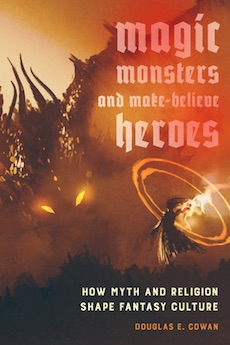By Louis J. Kern
This is the last in a series works (2008-19) examining the relationship between religion and popular culture. Cowan previously considered the reliance of horror films on a religious sub-text (Sacred Terror), science fiction film and television’s projection of a utopic afterlife (Sacred Space), and Stephen King’s religious imagination (America’s Dark Theologian). Here Cowan undertakes a comprehensive overview of fantasy and super-hero film and television, on-line and live action video games, comics conventions, and cosplay.
He explores the role of the mythic imagination and fantasy in our understanding of our humanness and the construction of our individual identities. From modern cinematic re-imaginings of fairy tales to comic book superheroes, from Dungeons and Dragons to Game of Thrones, from The Hobbit to Buffy the Vampire Slayer, from King Arthur to Bruce Lee, to Alien’s Ellen Ripley, Cowan interrogates the value of myth and fantasy for the construction of personal identity and a deeper understanding of our place in the cosmos.
Solidly grounded in scholarly studies of fairy tales, fantasy, and myth, Magic, by turns taxonomical and topical, identifies four types of fantasy—“the portal-quest, the immersive, the intrusive, and the liminal.” Our fantasy story worlds provide access to our mythical imagination; they do not offer “happy ever afters” or provide definitive answers to existential questions, but are open-ended, thus provoking questions that provide pathways to discovery. They are about the journey not the destination.
Cowan considers variants of Cinderella and Snow White, seen as “princess diaries,” demonstrating that there is nothing childlike about fairy tales. These tales explore the nature of “true identity,” the power of good vs. evil, and the possibility of “love at first sight.” They range from the animated musical Disney version of Snow White and the Seven Dwarfs (1937) to the darker witchery of Maleficent (2014).
Cowan classifies the Western hero as “warrior in the wasteland” (Max Rockatansky—Mad Max), the “world builder” (King Arthur), and the “world savior” (Buffy, the vampire Slayer), and considers “warrior heroines” (Alice Marcus, Resident Evil, and Sara Pezzini, Witchblade). He examines the Eastern mythic hero comparatively in a discussion of kung fu and wushu movies, especially those of Jackie Chan.
This volume offers a sympathetic understanding of the world of comic cons, cosplay conventions, fantasy gaming, massive multi-player games, and live action role-playing games like Titansgrave that effectively refutes common biases about enthusiasts being slackers, nerds, or geeks. It proposes a post-modern construction of popular culture that emphasizes its extensive inter-textuality, drawing from television, film, games, comics, and graphic novels, music, and art. More than a vehicle of escape, it becomes a portal to exploration of a complex world of imagination and possibility.
Cowan, who has studied the sociology of modern paganism on the internet and the religious roots of horror cinema, has described himself as a “methodological agnostic.” Although an ordained minister in the United Church of Canada, he finds our relationships with our gods/goddesses as with our heroes/heroines to be “subjective, erratic, and precarious.” Biblical literalism he sees as fundamentally fantastic; he finds no distinction between religious and magical interactions with the supernatural, and emphasizes the Christian appropriation of popular culture, re-reading it as reaffirmation of theology.
This work may be read with pleasure by a popular audience while offering interesting insights for a close reading of popular cultural forms. It points to the fundamental necessity for a culture of the fantastic as a survival tool in an increasingly darkling near future where, as Annalee Newitz observed, “we will need it to find the escape route” (“We Need Games of Thrones,” New York Times, 11 April 2019).
Louis J. Kern (ΦBK, Clark University) is professor emeritus of history at Hofstra University. Hofstra University is home to the Omega of New York chapter of Phi Beta Kappa.




